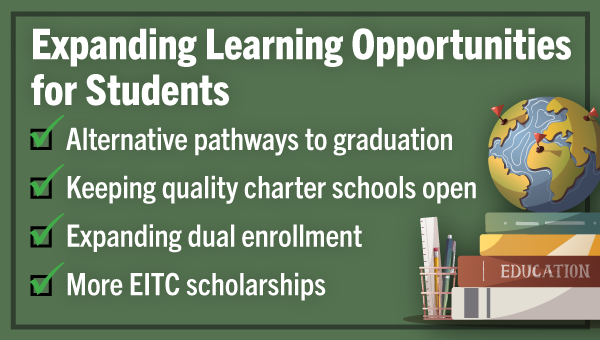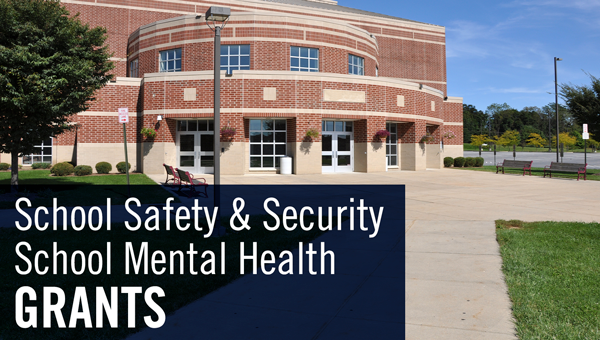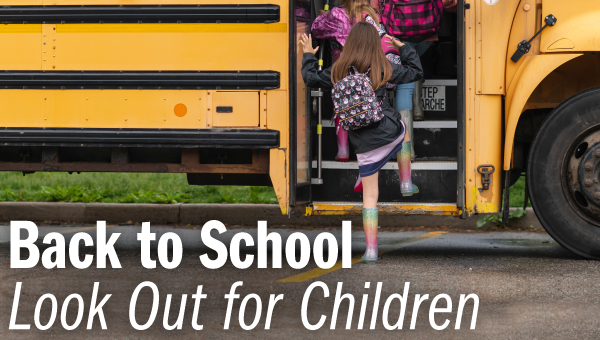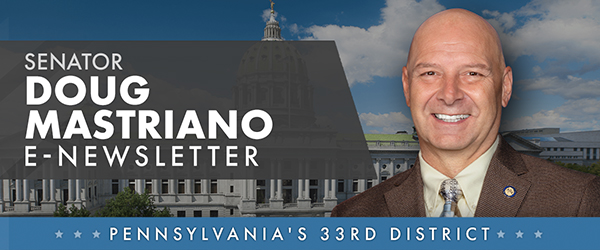|
View this email in a browser
In this Update:
- Mastriano Renews Call for Tyler’s Law as Rainbow Fentanyl Poses Heightened Danger
- Families Want Education, Not Indoctrination
- Education Improvements Enacted by the General Assembly
- Schools have Until Aug. 31 to Apply for Security and Mental Health Grants
- Please Watch for Children as Schools Open
- PennDOT Jobs Available for CDL Drivers
- PA ABLE Helps Pennsylvanians with Disabilities
HARRISBURG – Sen. Doug Mastriano (R-33) renewed the call for Pennsylvania to get tougher on drug dealers after reports of a more potent, rainbow-colored version of fentanyl circulating on the West Coast made recent headlines across the nation.
“This alarming news proves exactly why fentanyl dealers in Pennsylvania must pay for the lives they take every day,” Mastriano said. “I introduced Tyler’s Law to impose harsher sentences on drug delivery resulting in death. Dealers shouldn’t walk away scot-free for callously profiting off the escalating opioid epidemic.”
Senate Bill 1295, introduced in June, would impose a 25-year mandatory minimum for fentanyl distribution resulting in death. The sentence would only cover monetary transactions and wouldn’t apply to drug users that share with friends and family or seek medical help when another individual is overdosing.
Mastriano dubbed the bill “Tyler’s Law” in remembrance of 18-year-old Tyler Shanafelter, a district resident who overdosed and died when he unwittingly bought fentanyl-laced Percocet.
“Tyler’s tragic death should not be in vain,” Mastriano said. “Although nothing we can do will bring this young man back to his family, we can take steps to prevent more unnecessary death and suffering.”
Fentanyl is a powerful synthetic opioid analgesic 50 to 100 times more potent than morphine. It’s often cut, colored, scored, pressed and then sold as a counterfeit version of other narcotics like OxyContin, Percocet or Xanax. Just two milligrams of fentanyl can trigger an overdose.
That’s why Mastriano is renewing focus on his legislation after Multnomah County Sheriff’s Office in Oregon issued a warning to the public last week about rainbow fentanyl, which sometimes resembles sidewalk chalk or candy, discovered during a warranted search in northeast Portland.
Investigators believe this version of the drug is stronger and will lead to more overdoses, especially among children and young adults who may find the design more appealing.
Fentanyl is easier to produce and distribute than heroin, making it a popular choice among dealers and traffickers. According to the Centers for Disease Control, there were over 100,000 fentanyl and opioid related deaths in 2021, a 15% increase from 2020. The epidemic only seems to be worsening here in Pennsylvania.
Under Pennsylvania’s current “drug delivery resulting in death” statute, defendants often cut deals for lenient sentencing and little to no jail time.
“The current punishment, or lack thereof, is unacceptable,” Mastriano said. “We must send a message to drug dealers that if you kill Pennsylvanians through the sale of fentanyl, you will be spending most of the rest of your life in prison.”
Families Want Education, Not Indoctrination
Educational choice in Pennsylvania was, at one time, a narrow debate over state funding of charter schools versus their traditional district counterparts.
For the last two years, however, “choice” has encompassed a range of decisions once left exclusively to families. When I began my Senate career four years ago, few could imagine a Pennsylvania where students were forced to wear masks, given access to explicit materials and exposed to advanced gender theory without consent. The relationship between families and teachers, more often than not, enhanced the educational experience, instead of hindering it.
now, residents across my district tell me the dissolution of their faith in our state-run education system is at an all-time high. Recently, roughly 2,000 people responded to my office’s survey about what concerned them most about our public schools. The vast majority lamented the pervasiveness of political indoctrination and the lack of practical education spreading across our 500 districts like wildfire.
Others worried about worsening teacher shortages, the growing animosity between residents and elected district officials, the lack of support for families choosing homeschooling and the fear of violence leaving their children forever traumatized.
No longer does funding take center stage in our decades-long debate over how best to serve Pennsylvania’s students. Rather, families feel forcibly removed from their children’s educational journey – one they have the right to guide and protect above all else.
That’s why I supported legislation this year to prevent the governor’s administration from imposing regulations on charter schools that would hamstring their ability to serve more students as demand for more choice grows. I also stand opposed to their dogmatic commitment to slashing funding for public charters, most of which serve underprivileged and minority children in our largest cities.
Instead, we boosted funding for disadvantaged families seeking refuge from failing districts by opting for private schools instead. We invested a historic $200 million into school security and behavioral health support to provide a safer learning environment and give families peace of mind. We also made it easier for out-of-state teachers to get certified in Pennsylvania – a crucial step that will ease our shortage and attract more quality educators from across the country.
More must be done.
That’s why I introduced Senate Bill 996 earlier this year, which would establish a Parental Bill of Rights. A dozen other states have enshrined these rights via statutes, though no such protections exist in Pennsylvania.
We need this now more than ever after the constant erosion of parental rights over the past two years. We saw schools shuttered and families left without in-person learning alternatives. Parents have been labeled as domestic terrorists simply for advocating for what they felt was best for their child.
My legislation protects us from overreaching bureaucrats who attempt to silence their voice. When it comes to raising children, families know better than the government
Education Improvements Enacted by the General Assembly

When the General Assembly passed the 2022-23 state budget last month, we also enacted several provisions to improve education in Pennsylvania.
One problem we addressed was the potential teacher shortage faced by schools across the commonwealth. We took the first steps toward attracting more quality educators by streamlining the process for out-of-state teachers to receive certification in Pennsylvania. This critical provision will help get teachers who move to Pennsylvania into the classrooms quicker without any unnecessary delays due to red tape.
Additionally, we extended continuing education requirements to ensure good educators aren’t taken out of the classroom when we need them most. We also created a new Committee on Education Talent Recruitment that will provide grants and other resources to ensure we get the best and brightest teachers in front of students.
With statewide graduation requirements going into effect this school year, the reforms also included a provision to create an alternative graduation pathway for students impacted by COVID-19. In addition, we expanded dual enrollment so more high school students can enroll in higher education classes. This offers more young people a chance to earn college credits before high school graduation, better preparing them for college and allowing them to reduce the total cost of earning a degree.
Supporting education also means encouraging new learning options, no matter where the instruction takes place. Record new funding for the state’s popular Educational Improvement Tax Credit (EITC) scholarship program will ensure more kids can learn in an environment that suits their unique educational needs, including both public and private schools.
Finally, the General Assembly acted to eliminate onerous regulations that would have shuttered many quality charter schools. In addition to historic levels of state funding, these actions will help ensure Pennsylvania’s children have the educational foundation needed to thrive.
Schools have Until Aug. 31 to Apply for Security and Mental Health Grants

As part of this year’s budget negotiations, we made a historic investment in the safety of Pennsylvania students. This includes $95 million for school safety and security grants and an additional $95 million for school mental health grants.
School districts have until Aug. 31 to apply for this assistance. Safety and security grants help pay for security assessments, training and more. Mental health grants can be used for counseling, screening, early intervention and other initiatives.
Children need a safe and secure learning environment to succeed in school. These grants provide financial assistance to schools to implement the strategies that work best for them.
Please Watch for Children as Schools Open

With children returning to school, it’s a good time to revisit the state school bus stopping law.
- Motorists must stop at least 10 feet away from school buses that have their red lights flashing and stop arm extended.
- Motorists must stop when they are behind a bus, meeting the bus or approaching an intersection where a bus is stopped.
- Motorists following or traveling alongside a school bus must also stop until the red lights have stopped flashing, the stop arm is withdrawn and all children have reached safety.
- If physical barriers such as grassy medians, guide rails or concrete median barriers separate oncoming traffic from the bus, motorists in the opposing lanes may proceed without stopping.
- Do not proceed until all the children have reached a place of safety.
The penalties if convicted of violating the law include a $250 fine, five points on your driving record and a 60-day license suspension. For your sake and that of students and school employees, please be careful around school buses.
PennDOT Jobs Available for CDL Drivers

The Department of Transportation is hiring Winter CDL Equipment Operators. The job involves operating highway construction and maintenance equipment to perform snow removal duties and related tasks.
This is a seasonal position lasting from September through April, but there are frequent opportunities for promotion that include good benefits and career advancement.
Winter CDL Equipment Operators earn $18.53 to $20.49 per hour, based on location. To see counties where you might be interested in working, view PennDOT’s District map. Watch this video to learn more about this position.
PA ABLE Helps Pennsylvanians with Disabilities

PA ABLE is a savings program that helps to provide increased financial independence for Pennsylvanians with disabilities. Since being created by the General Assembly five years ago, the program has helped nearly 7,000 Pennsylvanians and their families save more than $75 million.
PA ABLE accounts allow individuals and families to save without affecting eligibility for means-tested federal benefits – and they offer tax advantages. Growth in PA ABLE accounts is tax-deferred, and withdrawals are tax-free when used for qualified disability expenses – which can include day-to-day things like groceries or rent, or larger, more long-term expenses such as assistive technology or vehicle modifications.
Eligible Pennsylvanians can open a PA ABLE account and choose from investment options or an interest-bearing checking account to best meet their savings goals. PA ABLE is administered by the Pennsylvania Treasury Department. To learn about program eligibility and how to open a PA ABLE account, visit paable.gov or call 855-529-2253.
|









